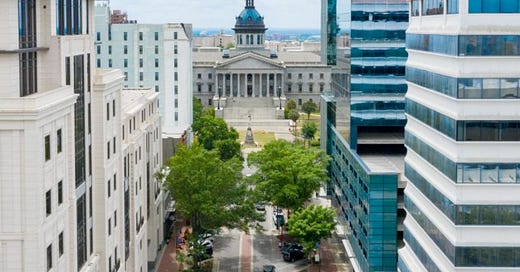What we know about Richland County's millage rate increase
The county auditor is proposing an 8.4% increase in millage rates -- and that's the bare minimum for the county to survive. If council wants special requests, the millage may go up by more.
Richland County is anticipating a 10% increase in property taxes next year and needs $15 million more in revenue in order to keep a balanced budget, according to county auditor Paul Brawley.
The last mileage rate increase brought in $3.1 million, so the county is anticipating a huge bump in revenue. It’s not clear exactly where the money is going.
Richland County appears to have been operating under a deficit for a while — dipping into emergency funds to balance their budget for years and overspending on legal fees and contracts, the county administrator said at a May 13 budget work session.
My previous reporting on this
The county needs to immediately stop using those emergency funds in order to keep a good credit score to borrow on, county administration said.
The proposed mileage increase is technically above the state’s limit for this year, which is set for inflationary purposes. The county is only allowed to increase by 2.4 mils this year, or 4.2% — except for certain circumstances outlined in state law.
One of those circumstances is if the county has not increased its mileage rate in the past three years, and technically, they haven’t. A recent assessment was done and many folks’ property values have risen, but council has not voted to increase the mileage since 2019, according to county auditor Paul Brawley.
He told me in an email that the county can use 2.4 mills from the previous years when it didn’t raise property taxes during the pandemic.
The State Fiscal Affair’s Office caps Richland County’s milage rate increase to 4.2% for this year, but there are exceptions under state law and council can vote to override the maximum.
Council would need a two-thirds vote to do that.
County administrstion is recommending Richland County use “lookback” mileage it has from the pandemic and increase its rates by 8.4% this year.
Why it matters
A spike in property taxes like Richland County is doing negatively impacts poor Black and Hispanic residents the most. Especially if Richland County is not using the funds to help residents with basic services. Richland County is among the worst in South Carolina and the U.S. in helping its poor, Black residents out of poverty.
Take a look at this project, which looks at the effects of high property taxes on poor Americans, at the Institute for Housing Studies at DePaul University.
They explain how Black and Hispanic residents are more burderned than high property taxes than other residents more generally. Research shows landlords are likely to pass on this increase in cost to renters.
Here’s an excerpt from their report.
Increased property taxes can be particularly burdensome for long-term owners and modest- or fixed-income households and can also contribute to affordability and displacement pressures as homeowners contend with increased housing costs and landlords pass the tax burden onto tenants through higher rents. Recent reporting in rapidly changing Chicago neighborhoods such as Pilsen, where the supply of lower-cost rental units has significantly dried up in the past decade, highlighted the stories of homeowners struggling with recent tax bill increases, which in some cases have been by thousands of dollars.
Property taxes are often a much larger burden on lower-income families than wealthier households. The Institute on Taxation and Economic Policy found that in 2018, the poorest 20 percent of taxpayers paid 4.2 percent of their income on property taxes, compared to 3 percent of income for middle-income taxpayers and 1.7 percent of income for the wealthiest 1 percent of households. Other research has found that these tax disparities are felt strongest by Black and Hispanic residents who are estimated to have a 10 to 13 percent higher property tax burden than households more generally. A study from the Center for Municipal Finance found that this disproportionate burden is, at least in part, a result of regressive tax assessments in which more affordable properties are often assessed above their true market value and expensive properties are assessed below their true market value.
No enforcement of mileage rate abuse
As I’ve been researching mileage rates, I’ve discovered that there’s no state agency that enforces if the county is following state law when setting its mileage rates. The only recourse we have is to go to council and voice our concerns.
It appears Richland County violated state law by failing to notify the public properly of its public hearing and the county failed to inform citizens of the proposed mileage rate prior to the hearing. I spoke to people at the hearing who were unaware that citizens could sign up at the hearing to speak — which appears to be a clear violation of the state’s budget process.
If Richland County wants to do right by the voters and the public, it needs to slow down, and be more transparent with what’s going on here. Trying to force a massive increase in property taxes with no clear explanation is not going to fly with us.
Since there’s no state agency here to enforce what’s going on, it’s up to you to keep up with what’s happening. Watch the budget meetings online, or even better, attend them in person.
A calendar of when the budget meetings are on the county website here.


